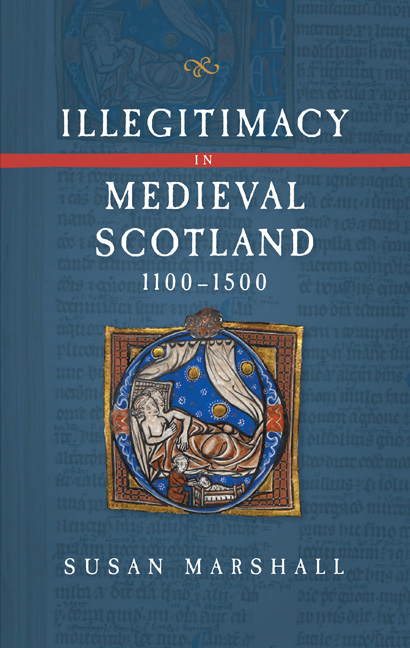Book contents
- Frontmatter
- Dedication
- Contents
- List of Tables
- Preface
- Acknowledgements
- Abbreviations
- Introduction
- 1 Church law and Scottish Families
- 2 Illegitimacy and Inheritance
- 3 Illegitimacy and Royal Succession I: Before the Great Cause
- 4 Illegitimacy and Royal Succession II: from the Great Cause to James I
- 5 Wives, Daughters, and Sisters
- 6 Church Careers and Sacrilegious Bastards
- 7 Illegitimacy in Political Life
- Conclusion
- Appendix I Scottish kings and their illegitimate offspring
- Appendix II Illegitimate sons of Scottish kings
- Timeline of key events
- Bibliography
- Index
2 - Illegitimacy and Inheritance
Published online by Cambridge University Press: 26 March 2021
- Frontmatter
- Dedication
- Contents
- List of Tables
- Preface
- Acknowledgements
- Abbreviations
- Introduction
- 1 Church law and Scottish Families
- 2 Illegitimacy and Inheritance
- 3 Illegitimacy and Royal Succession I: Before the Great Cause
- 4 Illegitimacy and Royal Succession II: from the Great Cause to James I
- 5 Wives, Daughters, and Sisters
- 6 Church Careers and Sacrilegious Bastards
- 7 Illegitimacy in Political Life
- Conclusion
- Appendix I Scottish kings and their illegitimate offspring
- Appendix II Illegitimate sons of Scottish kings
- Timeline of key events
- Bibliography
- Index
Summary
Off wrangus get cummis wrang successioun.
In canon law, ‘defect of birth’ established a barrier to the holding of Church offices with cure of souls, but illegitimacy also created a legal disability in secular law. In theory, the legal disability of bastardy prevented illegitimate people from holding high public offices, though there is little evidence that this was enforced in medieval Scotland. More critically, and certainly more widely implemented, illegitimacy was a bar to inheritance. Further, bastards could have no heirs except for their own legitimately procreated children – a nephew, for example, would be unable to succeed to an illegitimate person, even though nearest in kin. Ownership and transmission of land was the province of the secular law system and disputes came under the jurisdiction of courts other than those of the Church. Where doubt existed as to a person's legitimacy, and the dispelling of this doubt was required for secular law purposes (most often to confirm or deny inheritance rights), the usual procedure was for the spiritual courts to adjudicate as to the birth status of the person concerned, and for the civil courts to award heirship to the appropriate claimant.
There was an important and apparently irreconcilable difference with respect to illegitimacy between the canon law of the Church, and the common law of Scotland as expressed in Regiam Majestatem (RM), the earliest surviving secular law treatise for Scotland. The substantive difference between them centred on what each understood to be the effects of one form of canonical legitimation. In canon law, those legitimated according to their parents’ later intermarriage (legitimation per subsequens matrimonium) – were fully legitimate, and so by implication should not suffer the legal disability of bastardy in respect of inheritance. That canon law regarded those legitimated per subsequens matrimonium as heirs to heritage is acknowledged in RM, which then goes on to deny this right under the common law:
Arising out of this subject the question has been put whether a person begotten or born before his father married his mother is a lawful heir if his father subsequently marries his mother.
- Type
- Chapter
- Information
- Illegitimacy in Medieval Scotland1100-1500, pp. 29 - 54Publisher: Boydell & BrewerPrint publication year: 2021



